Bennani’s response to lockdown has been to expand her exploration of ‘the CAPS’, a speculative island space located somewhere in the Atlantic…
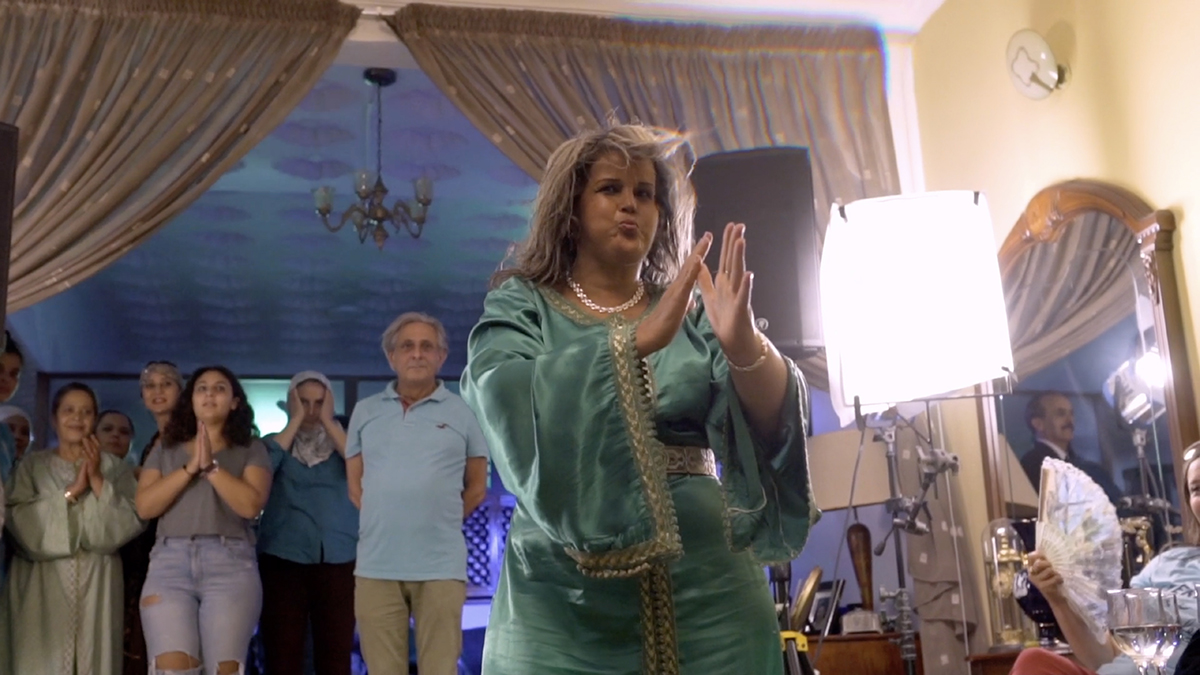
Lost at sea. A sea of information. The deep sea calls to mind both an abyss and an infinitely generative expanse, a biosphere teeming with life exceeding that which any David Attenborough documentary could capture. As human engagements were shunted online in March 2020, the Moroccan-born artist Meriem Bennani found herself stranded in New York, where she’d lived since 2009. With the city on lockdown and the public transit residents rely on to move about suddenly deemed unsafe, Bennani, like many, holed up in her apartment. There, brows- ing YouTube channels from her home country, she began to consider the poetic resonance between internet cables buried deep beneath the ocean floor and the endless streams of content they distribute across continents.
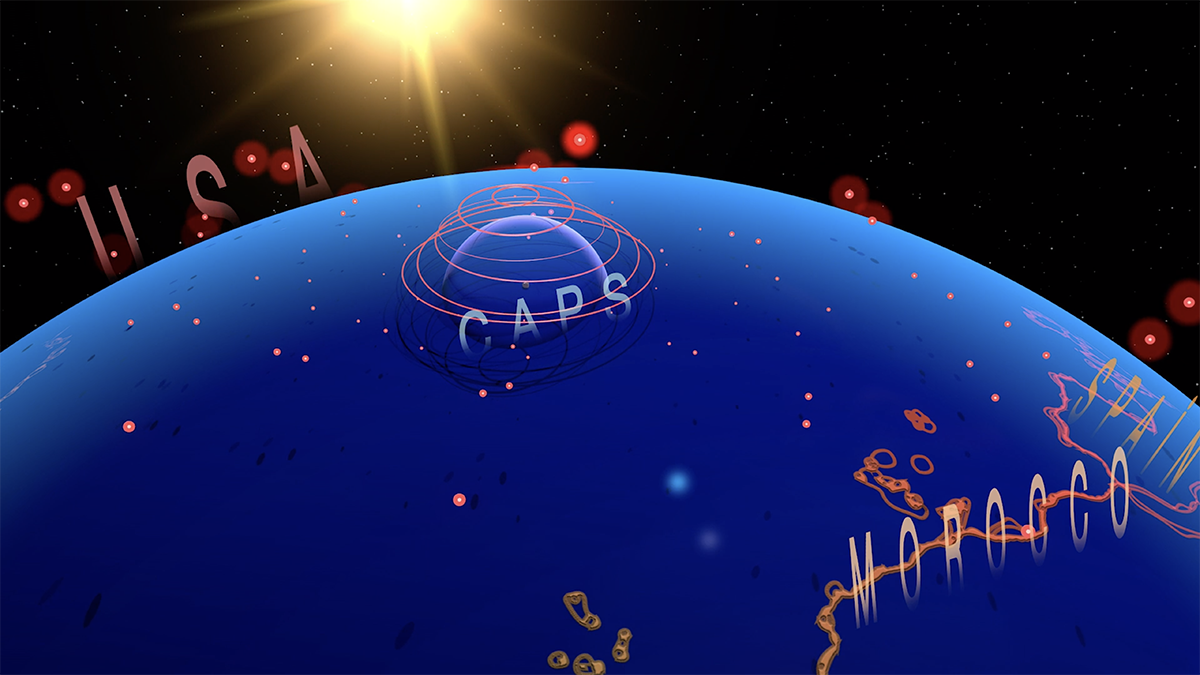
During this surreal gap year, in which it felt like work had been placed indefinitely on hold, Bennani managed to be impressively productive. She collaborated with the Israeli-born, New York-based filmmaker Orian Barki to make the video series 2 Lizards (2020), instalments of which were periodically released on Bennani’s Instagram feed. The eight-part series, in which the two artists voice animated lizards meandering through eerie video footage of a metropolis turned ghost town – a Manhattan-facing rooftop, a bodega, Times Square – encapsulated the cultural vertigo, anxiety and ennui that engulfed the city. The series was subsequently acquired by the Museum of Modern Art in New York.
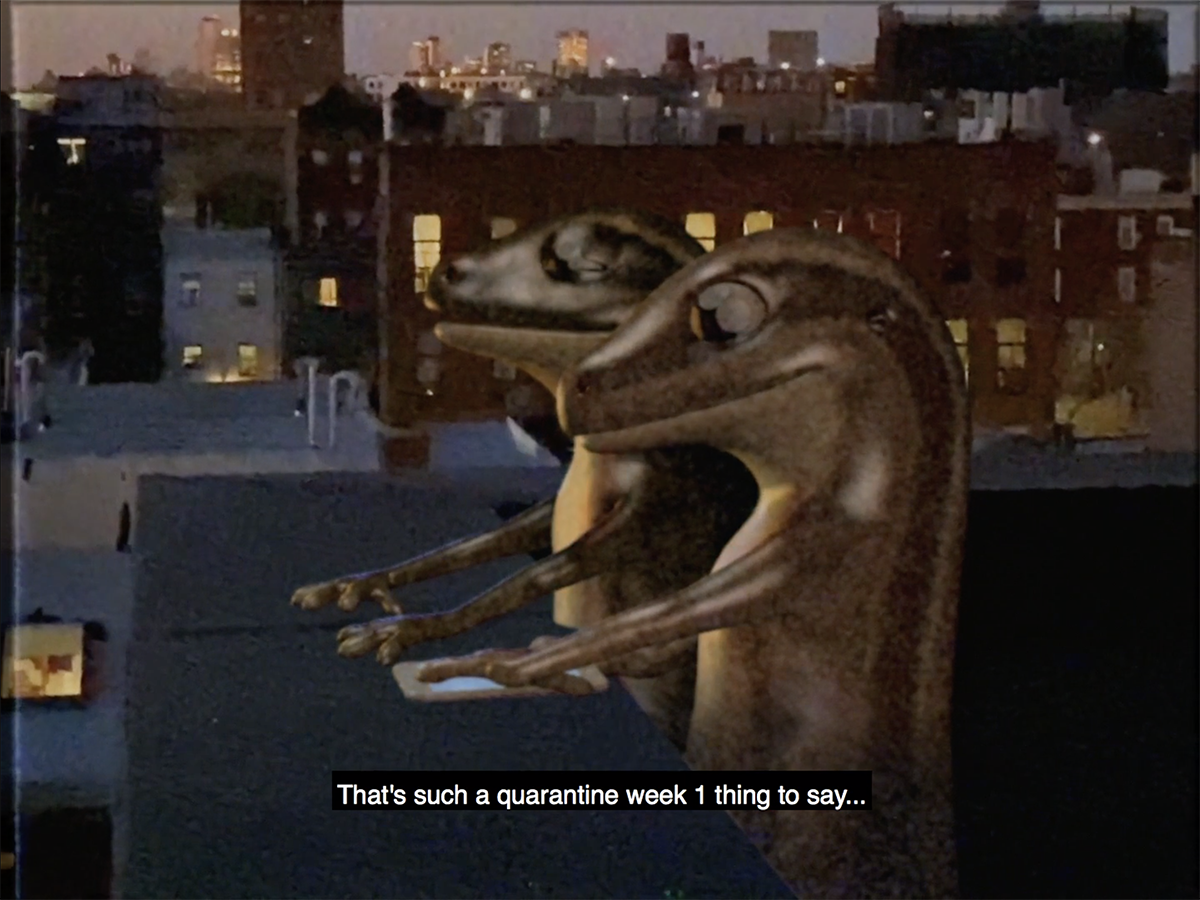
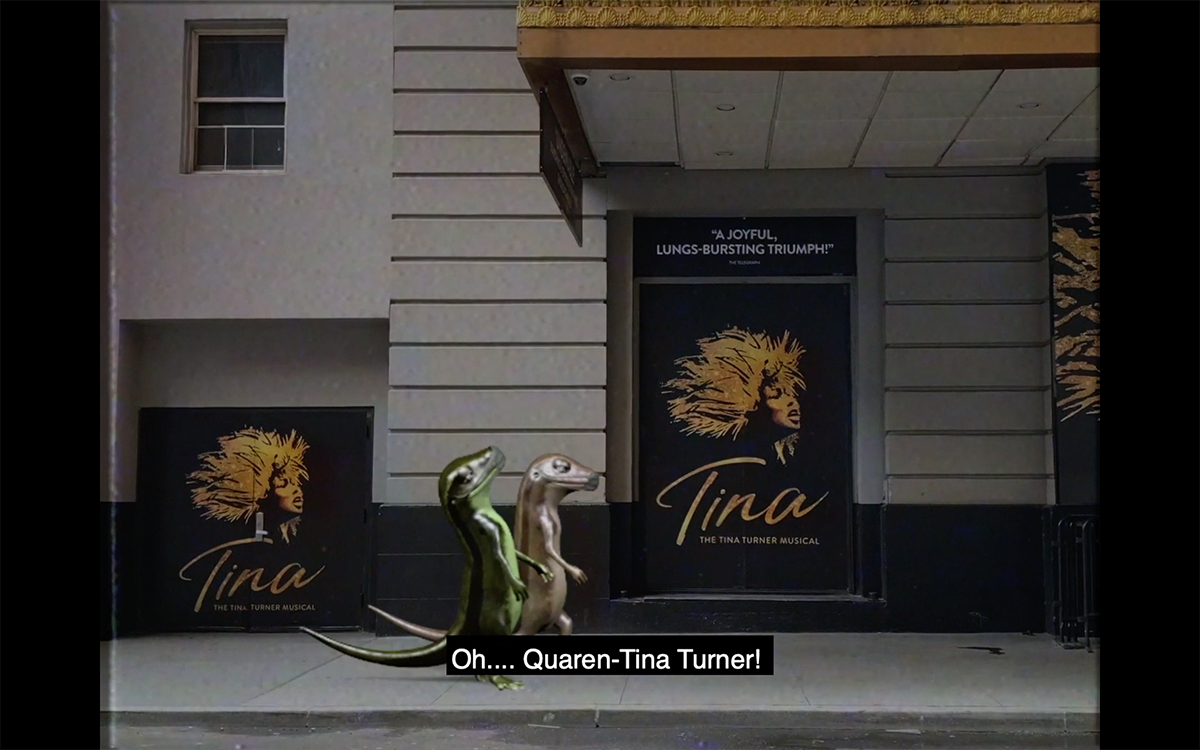
In addition to her collaboration with Barki, she created the solo videowork Guided Tour of a Spill (CAPS Interlude) (2021), which comes between the first and second instalments of her planned video trilogy documenting the inhabitants of a fictional community located on an island called CAPS somewhere in the middle of the Atlantic Ocean. (The second instalment, commissioned by Chicago’s Renaissance Society and Nottingham Contemporary in the UK, will open at the Renaissance Society next January.) Guided Tour of a Spill debuted at François Ghebaly in Los Angeles this March. The 16-minute video follows the inhabitants of the Moroccan quarter of CAPS, last seen in Party on the CAPS (2018–19). CAPS (short for ‘capsule’) is an invisibly domed dystopian detention centre from the near future – à la Don DeLillo’s White Noise (1985) or the film The Truman Show (1998) – a holding zone for would-be immigrants who, while attempting to teleport to the United States, have been intercepted by American armed forces, an ominous military group referred to as ‘Troopers’. Indefinitely detained on this isolated, swamp-rimmed island, refugees have built homes and established businesses as well as a mythology based around the ‘Croco’, an animated reptile who serves at once as idol, mascot and brand (its motif, per Bennani, is loosely based on the Lacoste logo) for CAPS inhabitants.
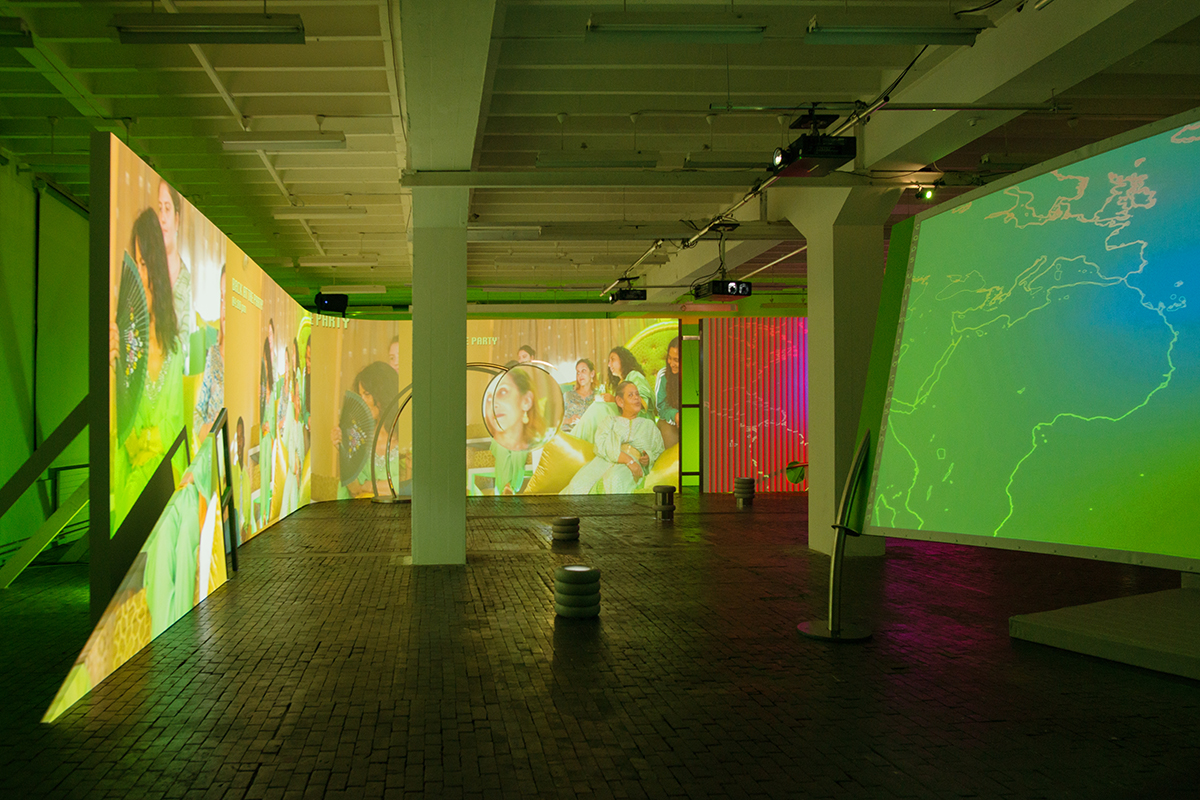
Party on the CAPS was shot on location in Rabat and Casablanca using Bennani’s friends and family as performers. The video depicts residents at a banquet hall, festively clad in the island’s ubiquitous ‘crocodile green’. The initial impression one gets from this work is that of a celebration captured by the roving eye of a travel-show videographer, intercut with the artist’s signature playful animations starring anthropomorphised CGI creatures. However, Bennani further alters her human subjects, including their faces, with distortions superimposed directly on the video footage. Revellers’ pupils are enlarged, the frames of their glasses made eerily sparkly, the cusps of their ears outlined with neon bands. All of this serves to underscore the CAPS residents’ place, or displacement, within the world they inhabit.

Like so much of this past year, this interim work was unplanned. Unlike Party on the CAPS, Guided Tour of a Spill was composed almost entirely from repurposed footage and animations. The video takes the artist’s strategy of revisitation and reuse to an endpoint whose logic resonates among viewers who experienced a vacuum year in quarantine. Guided Tour of a Spill was born of deep dives into online audiovisual content sourced from Moroccan and other Middle Eastern channels Bennani watched, and spliced with Getty footage and her own archives to create an admixture described, per the show’s press release, as a ‘YouTube soup’. It’s a mashup of hand-held amateur video and the animated style of 2010s-era electronica music-videos – perhaps most explicitly the 2011 animated video for DJ Fatima Al Qadiri’s Vatican Vibes, in which various images of ambiguously futurist revelry are undercut by ‘loading’ notifications, alerts and other reminders that we are in a cyberspace of sorts.
Necessity aside, there is something defiant in Bennani’s choice to lean on sampled material. She was frustrated by the volume of requests from galleries and museums to generate new content to fill the void left when they closed their physical doors – what her friend the artist Neïl Beloufa characterised to her as ‘artists being asked to be influencers’. Bennani describes her project thus: “I wanted Guided Tour of a Spill to be about a new space, and I thought, ‘What if the documented space is the digital space’. I was interested in the sci-fi device as a different methodology for documentary. The island of the CAPS allows me to make a sort of documentary about Morocco, but exploring it in a more speculative way. That space is rarely given to any story that is not at the centre.”
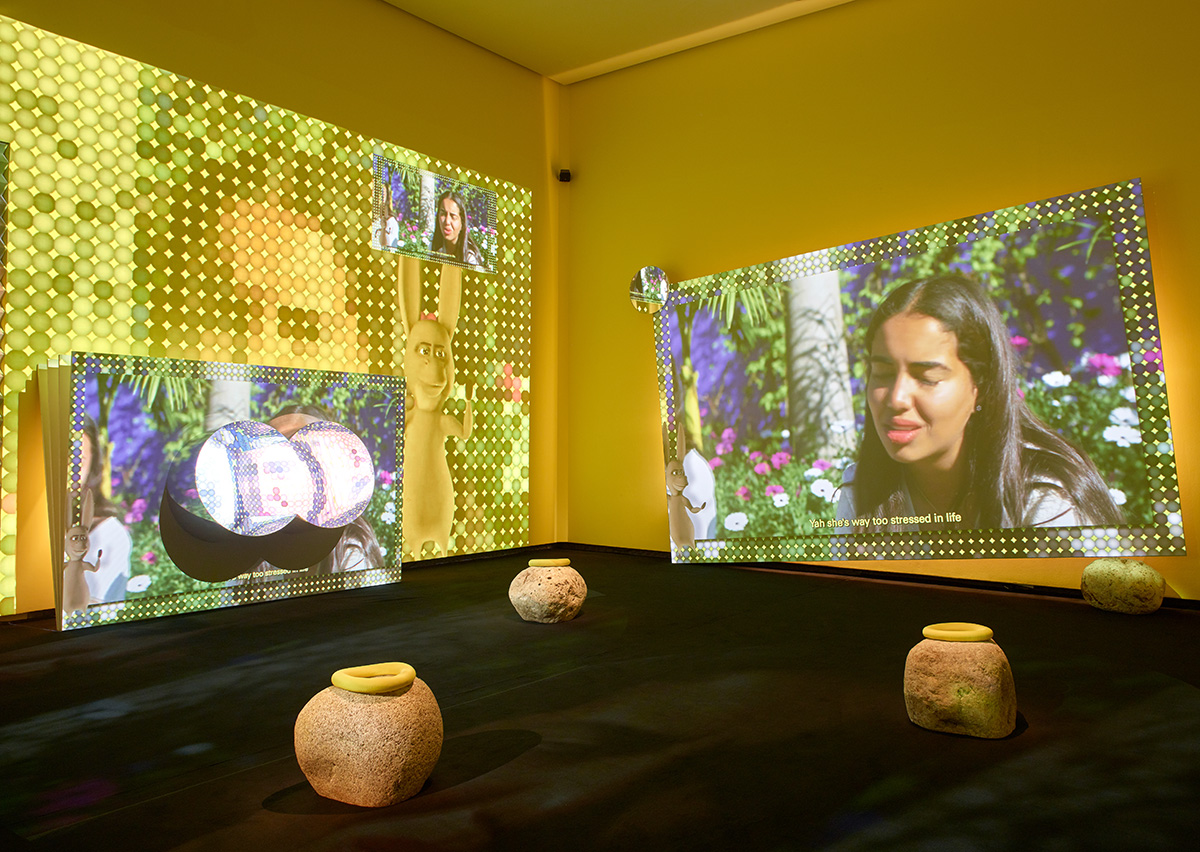
She continues, “I was thinking about Disney’s Fantasia. The film was clearly a display of groundbreaking animation techniques paired with some of the most famous European classical music. You watch it and you know this music is hegemonic, but the film is also very magical. It made me want to try and extract the magic and put it in the service of a different function with a different score – to see what would happen, if it would survive. If the imperialism embedded in the reference would die in the process of being repurposed or live on in a sneaky way. It’s an experiment.”
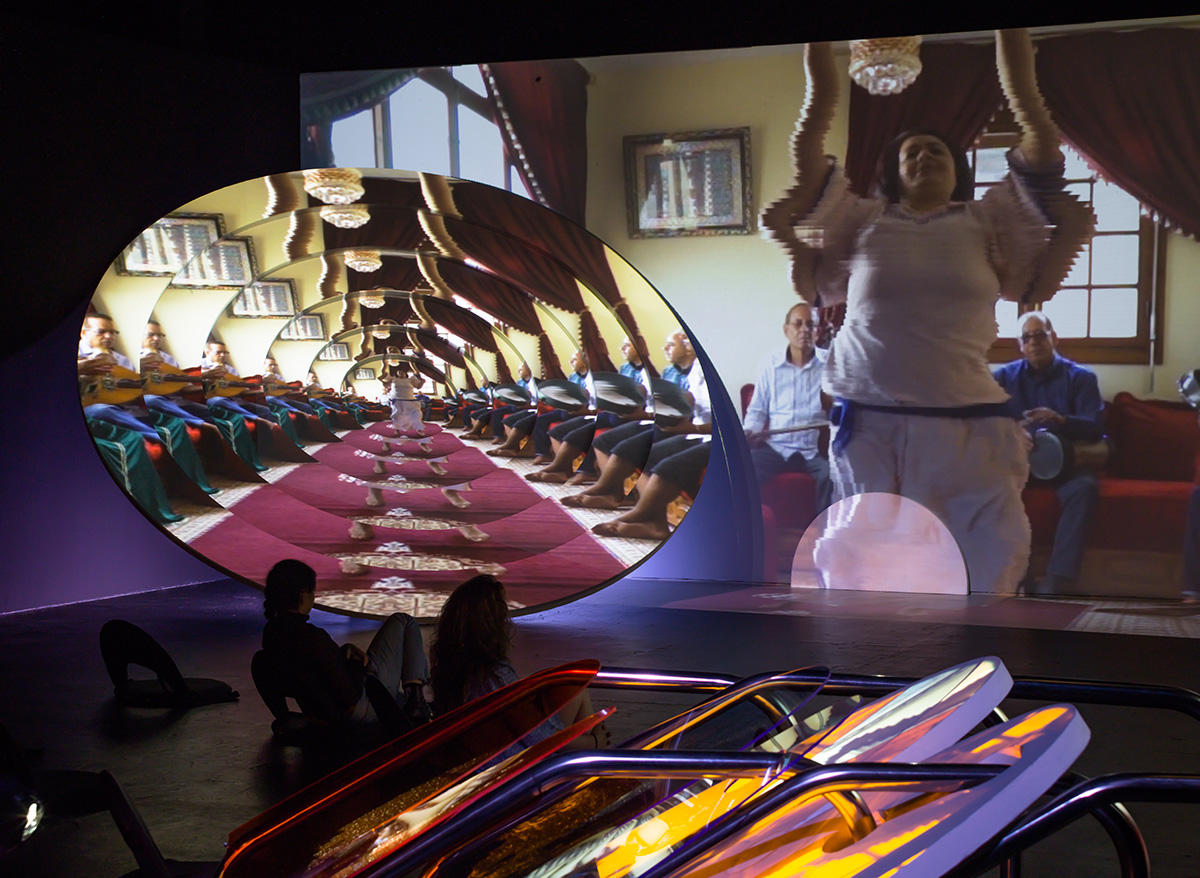
Guided Tour of a Spill’s musical segments – among them the sampled introductory track by Cheb Hicham Sghir, Nmout Wast Lebhar (2020), whose subtitled lyrics describe a youth who has left his home to find work and is now stranded at sea, and which (re)introduces us to the plight of the CAPS’s residents – are intercut by the piece’s most resonant components, for which Bennani enlisted Azzddin Tbakhi, a teenage star of Moroccan YouTube. Explaining their collaboration, she recounts, “I found this boy in Agadir, Morocco, who has a great YouTube channel and makes action movies. Azzddin is so prolific. He’ll film himself in training and then go into a monologue about how he’s going to protect his country. I thought it was interesting because the ‘enemy’ he wants to fight is kind of abstract, a bit like a Hollywood villain. I thought maybe he could replace Morocco with the CAPS in his monologues.” Bennani asked Tbakhi and friends to act out skirmishes with imaginary entities, which Bennani casts with a dark humour as the US Troopers, threatening his homeland. “I gave him a budget, some prompts and a shot list. He brought in five friends and they put together almost a paramilitary group – a militia called the Croco Gang. But for me it was especially cool to see them play. I asked them to film the moments in between the ‘action scenes’ that he doesn’t usually show in his videos. They’re still little boys, arguing over how to hang the Croco flag. I wanted to show both sides: them as little boys and them as warriors.” The teens and the militia they’ve constructed to combat an enemy registers at once as charmingly fabricated (in one shot some of the boys pose as Americans skirmishing with the Croco Gang, scribbled cardboard signs bearing the word ‘troopers’ taped to their backs) and all too real.
The remix process suits Bennani. Its efficacy hinges on her ability as a director to distil the melange of digital content we’ve been stewing in, this year more than ever, and pull out a reminder of our humanity, whether the community depicted looks familiar or not. To render it both commemorative of a year lived online and specific to her distinct experience as a homesick citizen of this planet.
First published in the May 2021 issue of ArtReview